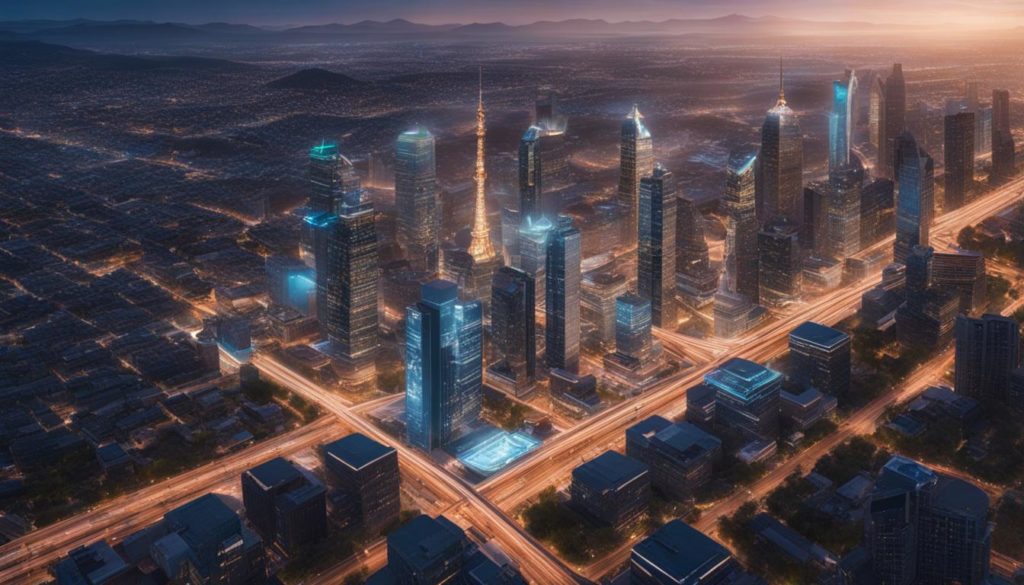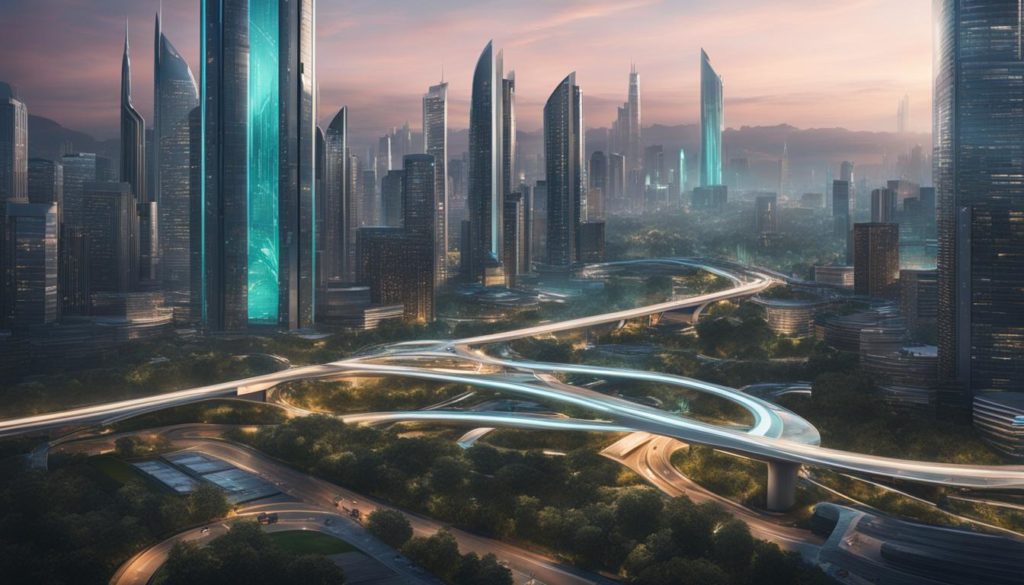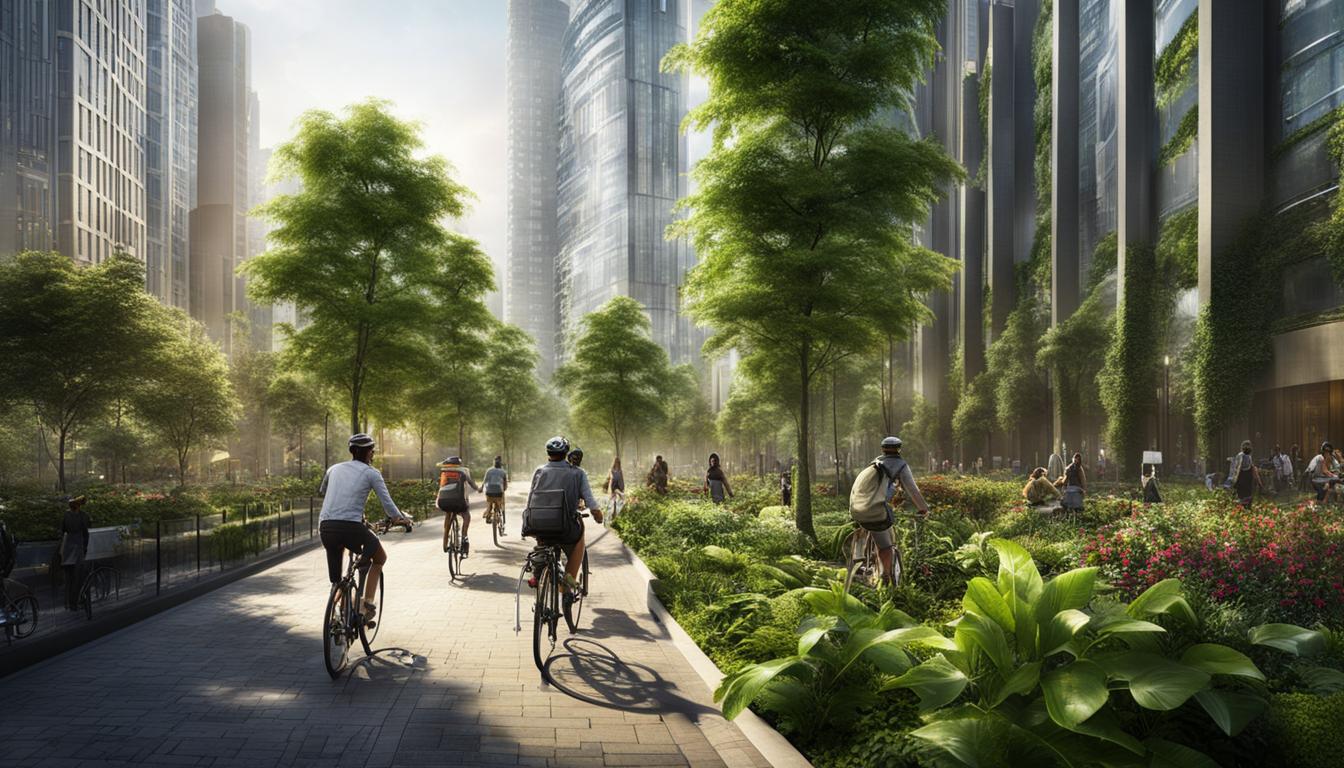As cities continue to grapple with the challenges of urbanization, sustainable urban planning has emerged as a vital solution. By leveraging the power of artificial intelligence (AI), cities can revolutionize their approach to urban development, creating eco-friendly and livable environments. AI-driven smart city planning utilizes advanced algorithms and data analysis to inform decision-making and resource allocation, leading to more efficient and sustainable outcomes.
The integration of AI in urban planning offers immense potential for cities to tackle pressing issues such as traffic congestion, air pollution, and resource management. Through AI-powered technologies, cities can optimize traffic flow, conserve energy, and enhance public safety. Additionally, AI enables a deeper understanding of citizens’ needs and preferences, facilitating the provision of tailored services and amenities.
This article explores the benefits, challenges, and impact of AI on sustainable urban planning. By harnessing the power of AI, cities can pave the way for smart, resilient, and eco-friendly urban environments.
Key Takeaways:
- Sustainable urban planning leverages AI to address the challenges of urbanization.
- AI enables efficient resource allocation and data-driven decision-making in urban planning.
- Ethical considerations and data accuracy are important factors when utilizing AI in urban planning.
- AI has a significant impact on energy efficiency, environmental monitoring, and personalized solutions.
- AI plays a crucial role in making cities resilient to climate change.
The Benefits of AI-Powered Urban Planning
AI-powered urban planning offers numerous advantages for cities aiming to create sustainable and livable environments. By harnessing the power of artificial intelligence, cities can make data-driven decisions that optimize resource allocation and enhance overall efficiency.
One of the key benefits of AI in urban planning is the ability to make informed decisions based on accurate data analysis. Machine learning algorithms can process vast amounts of data and provide valuable insights that can inform decisions related to traffic management, energy consumption, and public safety measures. This data-driven approach ensures that resources are allocated efficiently and effectively, leading to improved overall city operations.
Furthermore, AI-powered urban planning enables cities to create more livable environments. By leveraging AI algorithms, architects and planners can optimize space, light, and resources in architectural designs. This promotes the development of sustainable buildings and green spaces, improving the quality of life for city dwellers.
By harnessing the power of AI, cities can create more efficient, sustainable, and livable environments for their residents.
Overall, AI-powered urban planning offers immense potential for cities. It empowers planners and decision-makers to make data-driven decisions, optimize resource allocation, and create more livable spaces. By embracing AI, cities can pave the way for sustainable and thriving urban development.

| Benefits of AI-Powered Urban Planning |
|---|
| Enhanced decision-making based on data analysis |
| Optimized resource allocation |
| Creation of more livable environments |
Challenges of AI-Assisted Urban Planning
Despite the immense potential of AI-assisted urban planning, there are several challenges that need to be addressed for its effective implementation. One of the key challenges is ensuring data accuracy. AI relies heavily on accurate and reliable data to make informed decisions, and any inaccuracies or biases in the data can lead to flawed outcomes. Therefore, it is crucial to have robust data collection and validation processes in place to ensure the quality and integrity of the data used for AI-driven urban planning.
Ethical considerations also come into play when integrating AI into urban planning processes. AI algorithms, by themselves, cannot fully account for the diverse needs and preferences of citizens. It is essential to strike a balance between the efficiency and effectiveness of AI-driven decision-making and the ethical concerns related to issues such as privacy, bias, and equity. Incorporating ethical frameworks and guidelines in the development and deployment of AI systems is imperative to ensure that the technology is used responsibly and in the best interest of the community.
Another challenge in AI-assisted urban planning is the need for public engagement. While AI can analyze vast amounts of data and provide valuable insights, it cannot replace the input and expertise of urban planners, community leaders, and citizens. Public engagement plays a crucial role in enriching the planning process by incorporating local knowledge, diverse perspectives, and participatory decision-making. Balancing the power of AI with meaningful public engagement will contribute to more inclusive and sustainable urban development.

Overall, addressing the challenges of data accuracy, ethical considerations, and public engagement is crucial to harness the full potential of AI-assisted urban planning. By focusing on these areas, cities can ensure that AI is used as a tool to enhance decision-making, improve efficiency, and create more sustainable and livable urban environments.
The Impact of AI on Sustainable Urban Planning
AI integration has a profound impact on sustainable urban planning, revolutionizing the way cities approach energy efficiency, environmental monitoring, and personalized solutions. Through advanced data analysis and predictive modeling, AI-powered systems enable cities to optimize their energy consumption and reduce their carbon footprint. With real-time monitoring capabilities, AI can identify areas at risk of pollution and implement proactive measures to mitigate environmental hazards. This not only improves the overall quality of life for citizens but also contributes to the long-term sustainability of urban development.
One of the key benefits of AI in sustainable urban planning is the ability to develop personalized solutions that cater to the specific needs of a city or neighborhood. By analyzing data on demographics, infrastructure, and environmental factors, AI can generate insights and recommendations to design urban spaces that maximize livability and quality of life. This includes optimizing the use of space, designing eco-friendly buildings, and creating green spaces that promote health and well-being.
To illustrate the impact of AI on sustainable urban planning, the following table provides a comparison between traditional planning methods and AI-driven approaches in terms of energy efficiency, environmental monitoring, and personalized solutions:
| Factors | Traditional Planning | AI-Driven Planning |
|---|---|---|
| Energy Efficiency | Relies on manual analysis and static guidelines for energy consumption | Uses real-time data to optimize energy usage, reducing waste and promoting renewable energy sources |
| Environmental Monitoring | Reactive approach to pollution control and environmental preservation | Proactive monitoring of air and water quality, early detection of environmental risks, and efficient resource allocation for environmental preservation |
| Personalized Solutions | Generic urban planning that may not meet the diverse needs of different communities | Data-driven insights enable customized planning solutions that consider local demographics, culture, and specific requirements |
By leveraging AI, cities can transform their approach to sustainable urban planning, integrating cutting-edge technologies to optimize resource management, improve environmental sustainability, and enhance the overall quality of life for their residents.
AI-Driven Energy Efficiency
AI enables cities to optimize their energy usage through real-time monitoring and data-driven insights. By analyzing energy consumption patterns and identifying areas of inefficiency, AI-powered systems can suggest targeted improvements to reduce waste and promote the use of renewable energy sources. This not only helps cities achieve their sustainability goals but also lowers energy costs and enhances the resilience of urban infrastructure.
AI for Resilient Urban Planning
Climate change poses significant challenges for cities, increasing the importance of developing resilient urban planning strategies. Artificial intelligence (AI) plays a crucial role in enhancing cities’ resilience by leveraging predictive analytics and resource management. Through the analysis of vast amounts of data, AI can identify areas at risk of extreme weather events, enabling proactive planning and resource allocation. Additionally, AI assists in monitoring environmental factors such as air quality and water levels, contributing to effective disaster response and preparedness.
By integrating AI into urban planning, cities can optimize their response strategies to climate-related challenges. AI’s ability to process and analyze data enables more efficient allocation of resources during crises, ensuring that cities can effectively address the impacts of climate change. Furthermore, AI-powered predictive analytics help cities anticipate future climate-related risks, allowing for informed decision-making and proactive mitigation measures.
“The integration of AI into urban planning is pivotal for cities to become resilient in the face of climate change. AI’s predictive capabilities and resource management enable cities to optimize their responses to climate-related challenges, ultimately enhancing their overall resilience.”
Resource management is another important aspect of AI for resilient urban planning. AI algorithms analyze data on resource availability and demand, enabling cities to allocate resources more efficiently. This includes managing energy, water, and transportation systems to ensure optimal usage and minimize waste. By leveraging AI’s capabilities, cities can develop sustainable strategies that consider the long-term impacts of resource consumption and incorporate measures for resilience.
| AI for Resilient Urban Planning | Climate Change Resilience Strategies | Predictive Analytics | Resource Management |
|---|---|---|---|
| Uses AI to enhance urban planning strategies for increased resilience. | Identifies areas at risk of extreme weather events through data analysis. | Utilizes predictive analytics to anticipate future climate-related risks. | Optimizes resource allocation for effective response and sustainable management. |
| Monitors environmental factors such as air quality and water levels. | Enables proactive planning and resource allocation for disaster response. | Facilitates informed decision-making for climate mitigation measures. | Manages energy, water, and transportation systems for optimal usage. |
| Improves response strategies to climate-related challenges. | Contributes to effective disaster response and preparedness. | Enhances overall resilience of cities in the face of climate change. | Minimizes waste and considers long-term impacts of resource consumption. |
Conclusion
The integration of AI into urban planning holds tremendous potential for the creation of sustainable, efficient, and livable cities. By leveraging AI-driven decision-making, resource allocation, and personalized solutions, urban planning processes can be revolutionized. However, it is important to address challenges related to data accuracy, ethical considerations, and public engagement to fully harness the power of AI in shaping smart, resilient, and sustainable urban environments.
Despite the obstacles, the future of cities lies in embracing AI as a key tool in smart city development. Through the utilization of AI, cities can redefine their landscapes and drive sustainable development. By leveraging AI technologies, cities can tackle the pressing challenges of urbanization and pave the way for a better future for urban inhabitants.
As we move towards future cities, the adoption of AI in urban planning will play a vital role in transforming the way cities are designed, managed, and experienced. Sustainable urban planning, supported by AI, will lead to the creation of cities that prioritize the well-being of its citizens, optimize resource usage, and mitigate the impact of climate change. By embracing AI, cities can emerge as vibrant, efficient, and resilient urban spaces that foster a high quality of life for their residents.
FAQ
What is AI-driven smart city planning?
AI-driven smart city planning is an approach that utilizes artificial intelligence to analyze data and make informed decisions about resource allocation and future planning in cities. It aims to create more efficient, equitable, and sustainable urban environments.
What are the benefits of AI-powered urban planning?
AI-powered urban planning offers several benefits, including data-driven decision-making, efficient resource allocation, and the development of more livable cities. It can optimize traffic management, reduce energy consumption, improve public safety, and enhance architectural designs.
What challenges does AI-assisted urban planning face?
AI-assisted urban planning faces challenges related to data accuracy, privacy concerns, incomplete datasets, and ethical considerations. It is important to combine AI with other methods of urban planning, such as public engagement and stakeholder consultation.
How does AI impact sustainable urban planning?
AI enables cities to analyze data and make informed decisions regarding energy consumption, environmental monitoring, and personalized solutions. It helps optimize energy usage, identify areas at risk of pollution, and develop green spaces, ultimately promoting sustainability.
How does AI contribute to resilient urban planning?
AI contributes to resilient urban planning by predicting areas at risk of extreme weather events, enabling proactive planning and resource allocation. It also aids in monitoring environmental factors, supporting disaster response and resource management during times of crisis.
- Regulatory and Compliance: Pioneering the Future of Saudi Arabia’s Dedicated Cargo Airline - December 21, 2024
- Financial Strategies: Fueling the Growth of Saudi Arabia’s Dedicated Cargo Airline - December 20, 2024
- Operational Excellence: Ensuring Competitive Edge for Saudi Arabia’s Dedicated Cargo Airline - December 19, 2024






